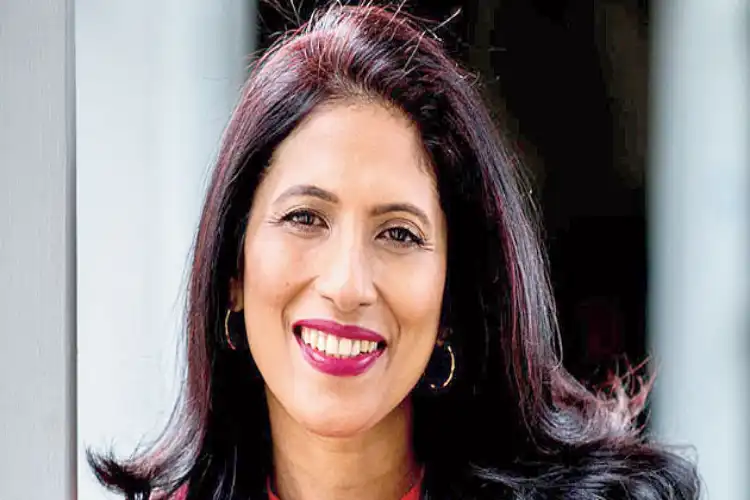 Sushma Ramachandran
Sushma Ramachandran
The appointment of Leena Nair as the new global chief executive officer (CEO) of the luxury fashion house, Chanel marks the breaking of a glass ceiling yet again. The first time a woman of Indian origin became the head of a multinational was when Indra Nooyi was appointed as Pepsi CEO. This second pathbreaking move catapults Nair into the league of other Indian male colleagues who are now heading global conglomerates like Satya Nadella, Sundar Pichai, Parag Aggarwal, and Shantanu Narayen.
What is of even greater significance is the fact that she is the first Asian to fill this role at Chanel. She was earlier the first Asian female and youngest-ever Chief Human Resources Officer at Unilever. While her achievement is being celebrated in the country, it comes on the heels of another Indian woman launching an IPO of one of the biggest unicorns in recent times. The success of Falguni Nayar, founder of beauty and fashion e-commerce platform, Nykaa, has been feted recently as her company’s IPO was over-subscribed by 82 times. The digital beauty company has emerged as one of the country’s biggest unicorns at a valuation of 7 billion dollars and a market capitalization of over Rs. one lakh crore.
In other words, Indian women are rapidly rising to the top in the corporate arena both within the country and abroad. The success of Nair and Nayar has put the spotlight on the increasing numbers of women who are now in leadership roles in business and industry. The banking sector especially has been known to have women at the helm of some of the biggest institutions. Naina Lal Kidwai, for instance, was for long heading HSBC India while Chanda Kochhar was at the top at ICICI Bank and Shikha Sharma at Axis Bank. In the public sector, Arundhati Bhattacharya was equally a pathbreaker when she became chairperson of the country’s largest bank, the State Bank of India.
The process of breaking the glass ceiling has been slower, however, for the rest of the corporate sector. This is even though more women than ever before are joining industry and business at the managerial level. Many are also now becoming entrepreneurs and have entered the digital space by becoming founders of numerous start-up ventures. As entrepreneurs, however, they continue to face many hurdles.
The most critical is that of finance. Study after study has shown that start-ups with women founders face much greater hurdles in raising finance than those with an all-male founders’ team. This has been seen at a global as well as domestic level. One of the fall-outs of the difficulty in obtaining finance is that many tend to self-finance their ventures and this, in turn, tends to make them more unstable.
Banks consider women less credit-worthy and have an impression that they may withdraw from business ventures at any time due to family responsibilities. This is an attitude that needs to change given the fact that women are reported to be more responsible about loan repayments.
Yet another perennial issue facing women entrepreneurs is maintaining the delicate balance between family and career. Women tend to be saddled with the entire burden of taking care of home and family life which is difficult to manage along with running a full-time business.
Yet with all these handicaps, there has been a global surge in women entrepreneurs. The number of such entrepreneurs has risen by over 116 percent over the past 20 years, according to Business Insider. As far as India is concerned, many tiny businesses are owned by women but these are often in the informal sector and thus find it difficult even to avail of bank loans. Lack of education also becomes a handicap in ensuring that these micro-enterprises are sustained in the long run.
For women in managerial roles, however, the route to the top has always proved full of obstacles. In this context, the elevation of Leena Nair is bound to prove inspirational. What is interesting is the fact that her career has been marked by working at the grassroots level in relatively small metros. Hailing from a small town, Kolhapur, she had little hesitation in working in places like Ambattur in Tamil Nadu and Taloja in Maharashtra. She was the first woman to work at a factory in Hindustan Unilever and the first to work a night shift there. She asserts that the most important learning from these experiences was resilience.
She is bound to have learned a lot too from her mentor who was, coincidentally, Indra Nooyi herself. But it cannot be overemphasized that most women in the corporate arena are not only given the same responsibilities as their male colleagues, they generally work harder to achieve the same goals. Even so, the glass ceiling remains stubbornly hard to break barring exceptional organizations that provide a supportive environment for promotions and growth. One such was ICICI Bank where K.V. Kamath famously mentored many women bankers who went on to earn accolades as leaders.
Even in the government where there are numerous women now heading ministries and departments, it has taken a long time to break rigid stereotypes of the past. In her memoir Breaking Through, eminent economist, the late Isher Ahluwalia wrote about how she was offered a government post at a lower level than her spouse, Montek Ahluwalia. This, even though she was better qualified with a doctorate from an Ivy League university abroad.
It has thus to be seen whether Nair’s elevation is going to remain a flash in the pan or whether it signals the harbinger of real change in the corporate sector. Much will depend on the extent to which gender equality has been integrated into the ecosystem of businesses around the world.

 Sushma Ramachandran
Sushma Ramachandran